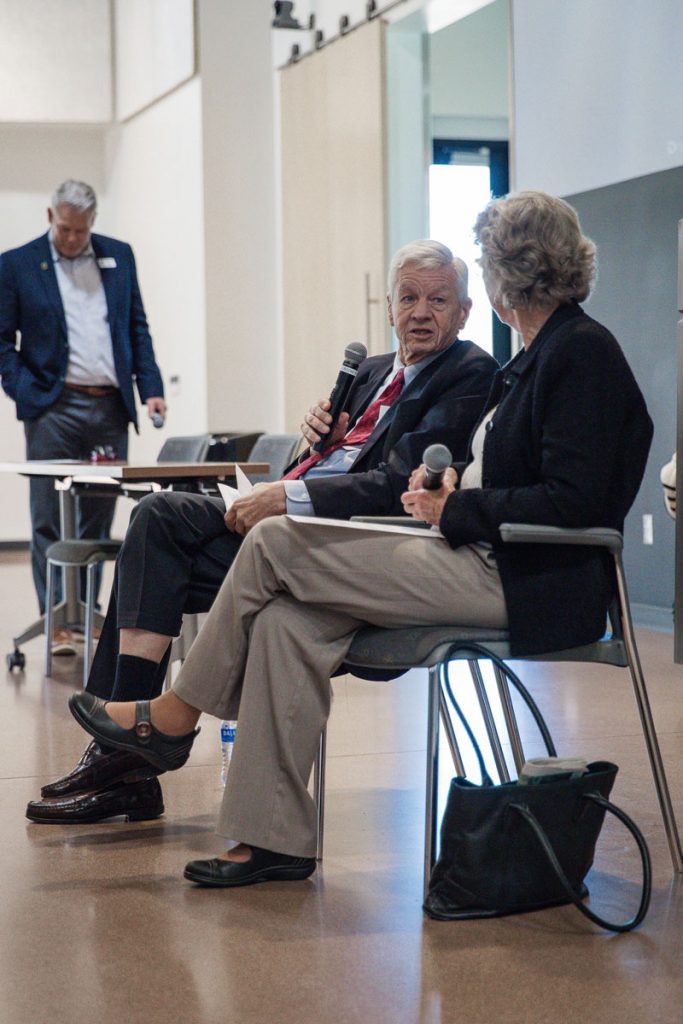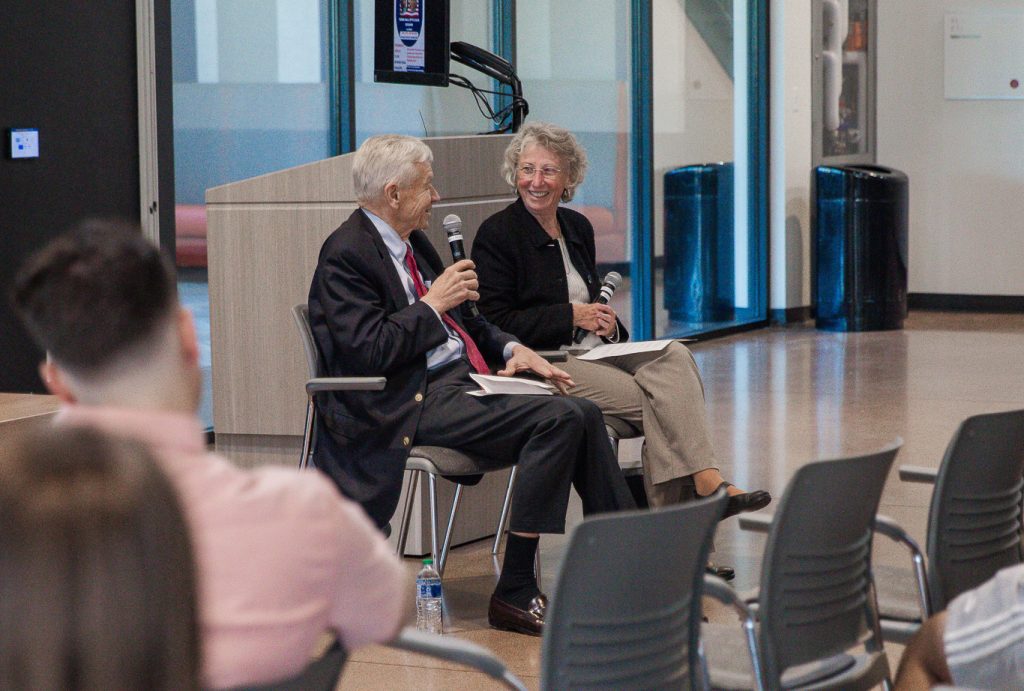Democracy: You may not always like it, but it’s the best political system we’ve got.
Winston Churchill said as much in a famous speech to the House of Commons in 1947. Nearly 80 years later, Karan English and Tom Petri, two former members of Congress, tend to agree.
“If you think our [democratic] system has some problems, I would suggest you go to Madagascar or Yemen—these are places where they’d give anything to have an election…process like we have,” said English, a Democrat who represented Flagstaff and other communities in northern and eastern Arizona in the 1990s. “Could there be opportunities for perfecting it? Probably. [But] there are so many opportunities to correct the system or change the system that other countries don’t have.”

English spoke alongside Petri at a Congress to Campus town hall event held Wednesday, April 10, on the NAU campus. Made possible by the non-profit organization Former Members of Congress and the Honors College political science fraternity Pi Sigma Alpha, the event drew a few dozen students, employees and community members who had the opportunity to “grill the Hill” about current political issues, the atmosphere in Washington D.C. and more. Andy Bertelsen, Coconino County’s deputy manager, served as emcee.
The event was part of the former lawmakers’ three-day visit to campus, which also included visits to classrooms, meetings with student clubs and receptions with other members of the NAU community.
A few hot-button topics came up—including, predictably, the security of the American voting system, something many current politicians worry is vulnerable to fraud and intervention in the run-up to the 2024 presidential election.
Don’t believe the outcry, the former representatives agreed.
“We are voting for presidential candidates…on the same ballot we’re electing people to the county, to state offices, to city positions, to school boards,” said Petri, a Republican who represented the 6th district of Wisconsin for 18 terms before retiring in 2015. “Those vocal people want to make sure the election is fair. If there are problems, I can guarantee you, they will talk about it. Democracy runs very deep in our country.”
For all the talk of growing political polarization in the United States, the two representatives from opposite sides of the aisle barely disagreed—except once, civilly, when the topic of expanding the House of Representatives came up. One NAU student pointed out that the House has remained the same size since 1929 and asked whether it should become larger in response to population growth.
English could see positive possibility in that change; she said she’d felt uncomfortable representing some 650,000 Arizonans from across the ideological spectrum.
“I just see the population growing, Congress representing more and more people and that is a difficult issue,” she said. “My personal feeling is, to restructure Congress by removing that cap—that opens up the opportunity for a third party, or a number of parties. I think Congress is so stuck on the process that’s currently in place that it will take a while for something like that to happen.”
Petri, on the other hand, wasn’t so sure: Change, he said, isn’t always good. He recalled the moment Congress updated its electronic voting system in the 2000s, making the voting process more efficient but, in his view, degrading the actual democratic process.
“Before that, we voted by quorum,” he said. “It would take all day, practically, to have a vote, so there were very few roll-call votes in Congress. The result was, there were very few ‘gotcha’ amendments and there was more open process on the floor. Reforms have consequences.”

When they weren’t discussing issues of the day, or polling students on the issues they cared about most (water use, immigration, affordable housing and abortion were among them), English and Petri were reminiscing fondly on their time in politics.
English recalled that finding success in Congress as a woman was more difficult than she had anticipated. She received training on how to dress to telegraph authority—in bright colors, and with big hair—and though some of the advice rubbed her the wrong way, she took it, reasoning that the ends might justify the means.
“One thing I did accomplish: I opened up the men’s [congressional] gym to women,” she said. “I was on the front page of The New York Times, holding a basketball and going into the men’s gym. From that point, they started allowing women to use the gym.”
Petri remembered that when he first entered politics as a state senator in Wisconsin, “for the first few months, I couldn’t understand what they were saying. It was like an auction—everything was going so fast.” Eventually, though, he learned the jargon and adapted to the speed, and he realized the job was a little bit “like reading the comics: The [political] issues don’t go away, they just evolve.”
A 40-year resident of Flagstaff, English also shared the story of how she got started in politics. She hoped it would show aspiring public servants that all it really takes is guts and passion.
“I was upset about not having water in Kachina Village—that’s what I ran on, and I won,” English said of her turn as a member of the Coconino County Board of Supervisors. “I had no background in water. I just knew that I had two babies and no water. [You start because] there are things that energize you, that you feel strongly about.”
Jill Kimball | NAU Communications
(928) 523-2282 | jill.kimball@nau.edu




